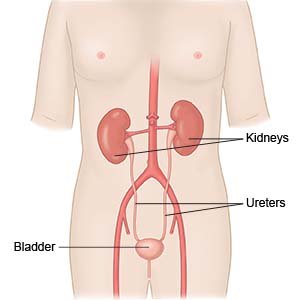Robot Assisted Pyeloplasty
Medically reviewed by Drugs.com. Last updated on Aug 4, 2025.
Robot-assisted pyeloplasty (RAP) is surgery to remove a blockage or narrowing between your kidney and ureter. RAP is done with a machine that is controlled by your surgeon. The machine has mechanical arms that use small tools to remove the blockage.
 |
DISCHARGE INSTRUCTIONS:
Seek care immediately if:
- You urinate less than usual or not at all.
- The incision area is red, swollen, or draining pus.
Call your surgeon or urologist if:
- You have a fever.
- You have nausea or are vomiting.
- You have questions or concerns about your condition or care.
Related medications
Medicines:
You may need any of the following:
- Acetaminophen decreases pain and fever. It is available without a doctor's order. Ask how much to take and how often to take it. Follow directions. Read the labels of all other medicines you are using to see if they also contain acetaminophen, or ask your doctor or pharmacist. Acetaminophen can cause liver damage if not taken correctly.
- Antibiotics help prevent or treat a bacterial infection.
- Medicine may be given to prevent or relieve bladder spasms. This may be needed if a stent was placed during surgery.
- Take your medicine as directed. Contact your healthcare provider if you think your medicine is not helping or if you have side effects. Tell your provider if you are allergic to any medicine. Keep a list of the medicines, vitamins, and herbs you take. Include the amounts, and when and why you take them. Bring the list or the pill bottles to follow-up visits. Carry your medicine list with you in case of an emergency.
Self-care:
Your healthcare provider may give you specific instructions. The following are general guidelines:
- Rest as needed. Your provider will tell you when you can return to work, school, or other daily activities. Do not drive until your provider says it is okay.
- Drink extra liquid. Liquid will help your urinary system work properly.
- Avoid strenuous activity. Do not play sports, do vigorous exercises, or lift anything heavier than your provider says is okay. You may need to avoid these activities for 4 to 6 weeks, or as directed by your provider.
- Do not smoke. Nicotine and other chemicals in cigarettes and cigars can delay healing. Smoking also increases your risk for infection after surgery. Ask your provider for information if you currently smoke and need help to quit. E-cigarettes or smokeless tobacco still contain nicotine. Talk to your provider before you use these products.
Care for the incision sites as directed:
Do not let the sites get wet until the surgeon says it is okay. When it is okay to bathe, do not scrub the sites. Just let water run over them. Gently pat the sites dry. Then put on new, clean bandages as directed. Change your bandages when they get wet or dirty. Do not put powders or lotions over the incision sites. Check every day for signs of infection, such as swelling, redness, or pus.
Follow up with your surgeon or urologist as directed:
You may need to return to have your wounds checked and stitches removed. Write down your questions so you remember to ask them during your visits.
© Copyright Merative 2025 Information is for End User's use only and may not be sold, redistributed or otherwise used for commercial purposes.
The above information is an educational aid only. It is not intended as medical advice for individual conditions or treatments. Talk to your doctor, nurse or pharmacist before following any medical regimen to see if it is safe and effective for you.
Further information
Always consult your healthcare provider to ensure the information displayed on this page applies to your personal circumstances.
